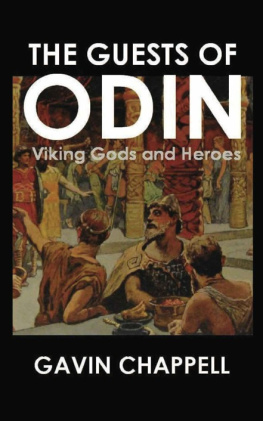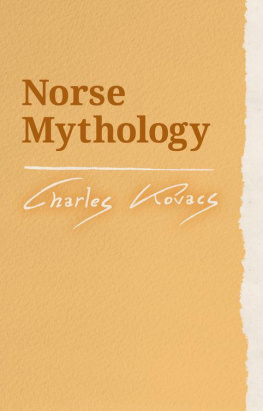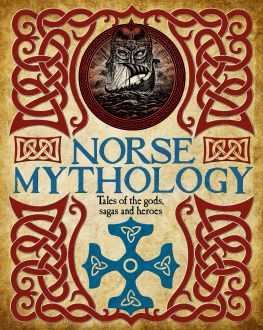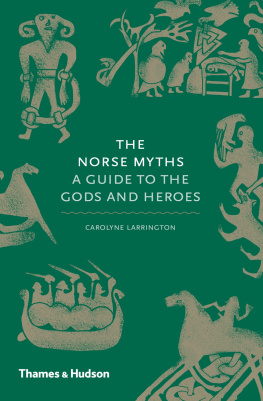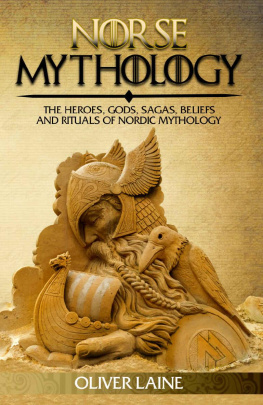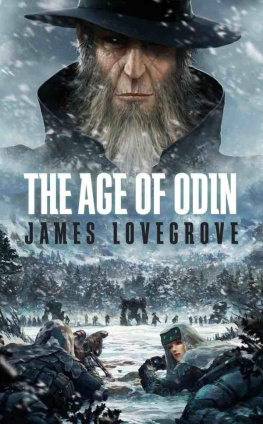Gavin Chappell - The Guests of Odin
Here you can read online Gavin Chappell - The Guests of Odin full text of the book (entire story) in english for free. Download pdf and epub, get meaning, cover and reviews about this ebook. year: 2013, publisher: Schlock! Publications;CreateSpace Independent Publishing Platform, genre: Art. Description of the work, (preface) as well as reviews are available. Best literature library LitArk.com created for fans of good reading and offers a wide selection of genres:
Romance novel
Science fiction
Adventure
Detective
Science
History
Home and family
Prose
Art
Politics
Computer
Non-fiction
Religion
Business
Children
Humor
Choose a favorite category and find really read worthwhile books. Enjoy immersion in the world of imagination, feel the emotions of the characters or learn something new for yourself, make an fascinating discovery.
- Book:The Guests of Odin
- Author:
- Publisher:Schlock! Publications;CreateSpace Independent Publishing Platform
- Genre:
- Year:2013
- Rating:5 / 5
- Favourites:Add to favourites
- Your mark:
- 100
- 1
- 2
- 3
- 4
- 5
The Guests of Odin: summary, description and annotation
We offer to read an annotation, description, summary or preface (depends on what the author of the book "The Guests of Odin" wrote himself). If you haven't found the necessary information about the book — write in the comments, we will try to find it.
The Guests of Odin — read online for free the complete book (whole text) full work
Below is the text of the book, divided by pages. System saving the place of the last page read, allows you to conveniently read the book "The Guests of Odin" online for free, without having to search again every time where you left off. Put a bookmark, and you can go to the page where you finished reading at any time.
Font size:
Interval:
Bookmark:
The Guests of Odin
Viking Gods and Heroes
Gavin Chappell
Copyright 201 3 Gavin Chappell
Copyright 2013 Thors Stone Press
All rights reserved. No part of this book may be reproduced or transmitted in any form or by any electronic or mechanical means, including photocopying, recording or by any information retrieval system, without the written permission of the publisher and author, except where permitted by law.
ISBN: 1483969304
ISBN-13: 978-1483969305
This book is the result of years of studying Norse mythology. One thing I noticed from very early on - even before I had read the primary sources like the Eddas, the sagas, and medieval Danish historian Saxo Grammaticus Gesta Danorum - was that in comparison with modern retellings of the Greek myths, accounts of Norse mythology were very sparse in their treatment of the heroes of legend, concentrating almost entirely on the gods. Sometimes there would be the story of Sigurd, occasionally Beowulf would appear. Retellings of the Greek myths, however, would include accounts of Theseus, Perseus, Odysseus, Heracles, Bellerophon.
Now and then, I encountered brief, enigmatic references to other Norse legendary heroes: Fridthjof, Hrolf Kraki, Harald Wartooth. These glimpses of entire cycles of tales about bloodthirsty warriors with bizarre names and even stranger epithets whetted my appetite. I wanted more. I started searching. When I went to university, ostensibly to study English literature, I found books I had only met references to before; the Eddas , the sagas, Saxo Grammaticus. That was when I first met the internet, a fairly new phenomenon in the mid-nineties, and there I found the original Old Icelandic versions of the sagas of legendary heroes, the Fornaldar Sogur . I studied Old English as part of my degree, and slowly, haltingly, I taught myself Old Icelandic to translate these sagas. I had my translations published on www.northvegr.org . I even had them patronised by academics ( Translating the Sagas by John Kennedy), and one website that appended not recommended to their links to my translations. Such is life. I never wanted an academic career anyway. Other people had started translating them to be fair, a few had been translated already, but they were scattered far and wide, in hard to find books. In the end, between my own attempts at translation, and my collection of obscure academic tomes, I read the entire corpus.
So, at long last, here is what Id always wanted to see: a popular retelling of Norse mythology that concentrates on the stories of the heroes, (or at least some of them), culled from the sagas, the Eddas, and the writings of Saxo Grammaticus thirteen of the Guests of Odin , the chosen slain who feast in the hall of Valhalla. I just hope you enjoy reading them as much as I enjoyed bringing them to light.
Id just like to say a thank you to those whove helped me on my way, in some form or another, in particular: Doctor Margaret Lockerbie-Cameron, Peter Tunstall, George L Hardman, Svanbjorna, and William P Reaves of www.germanicmythology.com
Gavin Chappell, West Kirby, Wirral, 4 October 2012
CONTENTS
Fridthjof the Bold | Pg 1 |
The Cursed Sword | Pg 14 |
Starkad the Old | Pg |
Hagbard and Haki | Pg |
Amlodi | Pg |
Bane of Champions | Pg |
The Trollwifes Fosterling | Pg |
The Eternal Battle | Pg |
Hrolf Kraki | Pg |
Harald Wartooth | Pg |
Warrior and Valkyrie | Pg |
The Broken Sword | Pg |
Sigurd the Volsung | Pg |
Fridthjof the Bold
When Fridthjof was growing up on the shores of the mighty Sogn Fjord, in Norway, he was so revered that everyone prayed for his welfare. His foster father was a man named Hilding, who also fostered Ingibjorg the Fair, daughter of Beli, king of the petty kingdom of Sogn, and two strong lads named Bjorn and Asmund. King Beli was getting old, and he was losing much of his property. Fridthjofs father Thorstein ruled over a third of the kingdom, and every three years he invited Beli to a banquet. Beli, however, feasted Thorstein every two years. Beli had a son named Helgi, and another called Halfdan, who were both devout worshippers of the gods. They were not very popular, however, but Fridthjof was thought without equal. He was so strong that he could row the great magical longship Ellidi with two oars, while other men were two to an oar. The kings sons soon grew jealous of his popularity.
Beli grew ill and died. On his deathbed, he called his sons to him and told them; Maintain the friendship that has existed between my kindred and Thorsteins family, and raise a burial mound for me.
Not long after, Thorstein also took sick and died, but before his death, he told his son Fridthjof: Yield to the sons of Beli, and bury me in a mound on the fjord shore opposite where Beli was laid to rest.
Thorstein died . Fridthjof buried him accordingly, and took over his property and wealth, including the farm at Framness, the longship Ellidi and the most precious golden ring in Norway.


Now Fridthjof became a famous man, and he valued his foster brother Bjorn over all others, while Asmund served both of them. Fridthjof was so generous that it was said that he was no less honourable than the kings were, except that he was not of royal blood. This angered the kings, this, and the fact that Fridthjof and their sister Ingibjorg had fallen in love. When they came to a banquet at Framness, where Fridthjof entertained them splendidly, they saw that he spoke often with their sister, who admired the gold ring he had inherited from his father. The kings sons went home, their envy of Fridthjof undiminished.
Soon after, Fridthjof was seen to look sad. His foster-brother Bjorn asked him, What is wrong?
Fridthjof said, I intend to woo Ingibjorg, since although I am lower in rank than the brothers I am no lower in personal worth.
They went to the kings and found them sitting on their fathers burial mound. Fridthjof greeted them courteously and asked for Ingibjorgs hand in marriage. The kings refused, saying that Fridthjof lacked dignity. Fridthjof accepted this, but told them, You need not expect my assistance in future. Then he went home.
A king named Hring ruled over the nearby kingdom of Ringeriki. By this point, he was growing old. When he heard that Fridthjof and Belis sons had quarrelled, he saw this as an opportunity to show that even in his old age he was not a weak man. He sent messengers to Belis sons demanding they pay him tribute, or else prepare to face his army.
When Helgi and Halfdan heard King Hrings words, they said, We would rather fight than pay tribute, though we deem it shameful to fight a man so old and decrepit.
They gathered an army, but since they saw that their numbers would be small, they sent Fridthjofs foster-father Hilding to Fridthjof to ask him for aid.
When Hilding reached Fridthjof, he found him in the hall, playing chess with Bjorn. Hilding gave his message and Fridthjof made no reply, but told Bjorn, I see an opening that cannot be mended. I will attack the red piece, to see if it could be saved.
Hilding said, If you do not join the kings, you can expect rough treatment in future.
Next pageFont size:
Interval:
Bookmark:
Similar books «The Guests of Odin»
Look at similar books to The Guests of Odin. We have selected literature similar in name and meaning in the hope of providing readers with more options to find new, interesting, not yet read works.
Discussion, reviews of the book The Guests of Odin and just readers' own opinions. Leave your comments, write what you think about the work, its meaning or the main characters. Specify what exactly you liked and what you didn't like, and why you think so.

